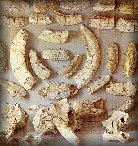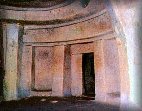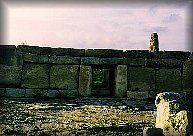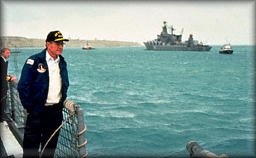
 The history of Malta dates
back 3800 BC. Proof of this fact are found in caves such as that of Ghar Dalam which is
situated in a site near Birzebbuga and in remains of villages like Skorba situated near
Nadur. The Neolithic farmers who lived in these sites produced pottery very much similar
to that found in eastern Sicily. There are theories that the Maltese Islands were a
form of a mountain linked to Europe in these early stages. However no formal proof of this
was ever produced. In fact, this theory is only based on animal remains found in Ghar
Dalam and in other sites around Malta.
The history of Malta dates
back 3800 BC. Proof of this fact are found in caves such as that of Ghar Dalam which is
situated in a site near Birzebbuga and in remains of villages like Skorba situated near
Nadur. The Neolithic farmers who lived in these sites produced pottery very much similar
to that found in eastern Sicily. There are theories that the Maltese Islands were a
form of a mountain linked to Europe in these early stages. However no formal proof of this
was ever produced. In fact, this theory is only based on animal remains found in Ghar
Dalam and in other sites around Malta. 
 Rock-cut collective tombs
such as those found at Ggantija (situated in Gozo) and Hagar Qim (situated near Zurrieq)
date back 2400 BC. In these sites it is said that a cult of the death of Stone Age or
Copper Age evolved, where it culminated in the unique underground burial chamber, also
known as the hypogeum near Rahal Gdid. This culture actually came to a sudden end around
2000 BC.
Rock-cut collective tombs
such as those found at Ggantija (situated in Gozo) and Hagar Qim (situated near Zurrieq)
date back 2400 BC. In these sites it is said that a cult of the death of Stone Age or
Copper Age evolved, where it culminated in the unique underground burial chamber, also
known as the hypogeum near Rahal Gdid. This culture actually came to a sudden end around
2000 BC. Evidence of the Bronze Age was found when remains of tools and weapons were found at Borg in-Nadur and Tarxien, while relics o the Iron Age of the period between 1200 BC and 800 BC include cart ruts found at Bingemma, Naxxar, Dingli and various other localities around the islands.
 Between 800 and 600 BC
contact with Semitic cultures was made. However, only few inscriptions were found to
indicate the evidence of Phoenician presence. On the other hand, Carthaginian presence in
the 6th century BC is proved by findings of coins, inscriptions and several Punic type
rock tombs. In 218 BC, the islands came under Roman political control. The islands were
subsequently given the status of municipium and were thus allowed to coin their own money
and control domestic affairs. According to tradition St. Paul was shipwrecked in Malta in
AD 60. The Maltese have been Christians uninterruptedly. (Lately theories proving
otherwise are coming out stating that there is a period were the Maltese practiced Islam.)
Between 800 and 600 BC
contact with Semitic cultures was made. However, only few inscriptions were found to
indicate the evidence of Phoenician presence. On the other hand, Carthaginian presence in
the 6th century BC is proved by findings of coins, inscriptions and several Punic type
rock tombs. In 218 BC, the islands came under Roman political control. The islands were
subsequently given the status of municipium and were thus allowed to coin their own money
and control domestic affairs. According to tradition St. Paul was shipwrecked in Malta in
AD 60. The Maltese have been Christians uninterruptedly. (Lately theories proving
otherwise are coming out stating that there is a period were the Maltese practiced Islam.)In AD 395, Malta was given to the control of Constantinople following the division of the Roman Empire. Subsequently, it was ruled by the Arabs. followed by the Normans and and a succession of feudal lords. In 1530, the Order of The Hospital Of St. John Of Jerusalem (also known as the Knights Hospitalers) a military and religious order of the Roman Catholic church took control of the Islands. Under the Grand Master Jean de La Valette, the Maltese successfully withstood the Ottoman siege of 1565.
In 1798 Napoleon Bonaparte captured the island, but the French presence was short-lived, and the island were returned to the Knights in 1802. The Maltese protested and acknowledged Great Britain's sovereignty. Malta's political status under Britain underwent a series of vicissitudes in which constitutions were successively granted, suspended, and revoked. British demands for Malta's military facilities dominated the economy, and the Dockyard became the colony's economic mainstay. The islands were favourably affected by the opening of the Suez Canal in 1869.
During World War II the islands repelled the Axis powers against severe odds, having been one of the most heavily bombed sites of the conflict. Consequently, Malta was given the George Cross, Britain's highest civilian decoration. Malta finally achieved independence within the Commonwealth on 21st September 1964. It became a Republic on the 13th December 1974 and gained freedom on the 31st March 1979 following the total closure of the British base.

 In
1987, following a change in government Malta started to seek full membership in the
European Community. Malta's growing international importance was acknowledged when it was
chosen as the site of the first summit meeting between Soviet President Mikhail Gorbachev
and U.S. President George Bush in 1989 which led to the end of the Cold War.
In
1987, following a change in government Malta started to seek full membership in the
European Community. Malta's growing international importance was acknowledged when it was
chosen as the site of the first summit meeting between Soviet President Mikhail Gorbachev
and U.S. President George Bush in 1989 which led to the end of the Cold War. Following a change in government in 1996, the application for full membership in the European Community was frozen. However, the new government lasted less than two years and following another change in government, the application was resubmitted. After the summit in Helsinki on December 1999, it was decided that negotiations with Malta will start on February 2000.